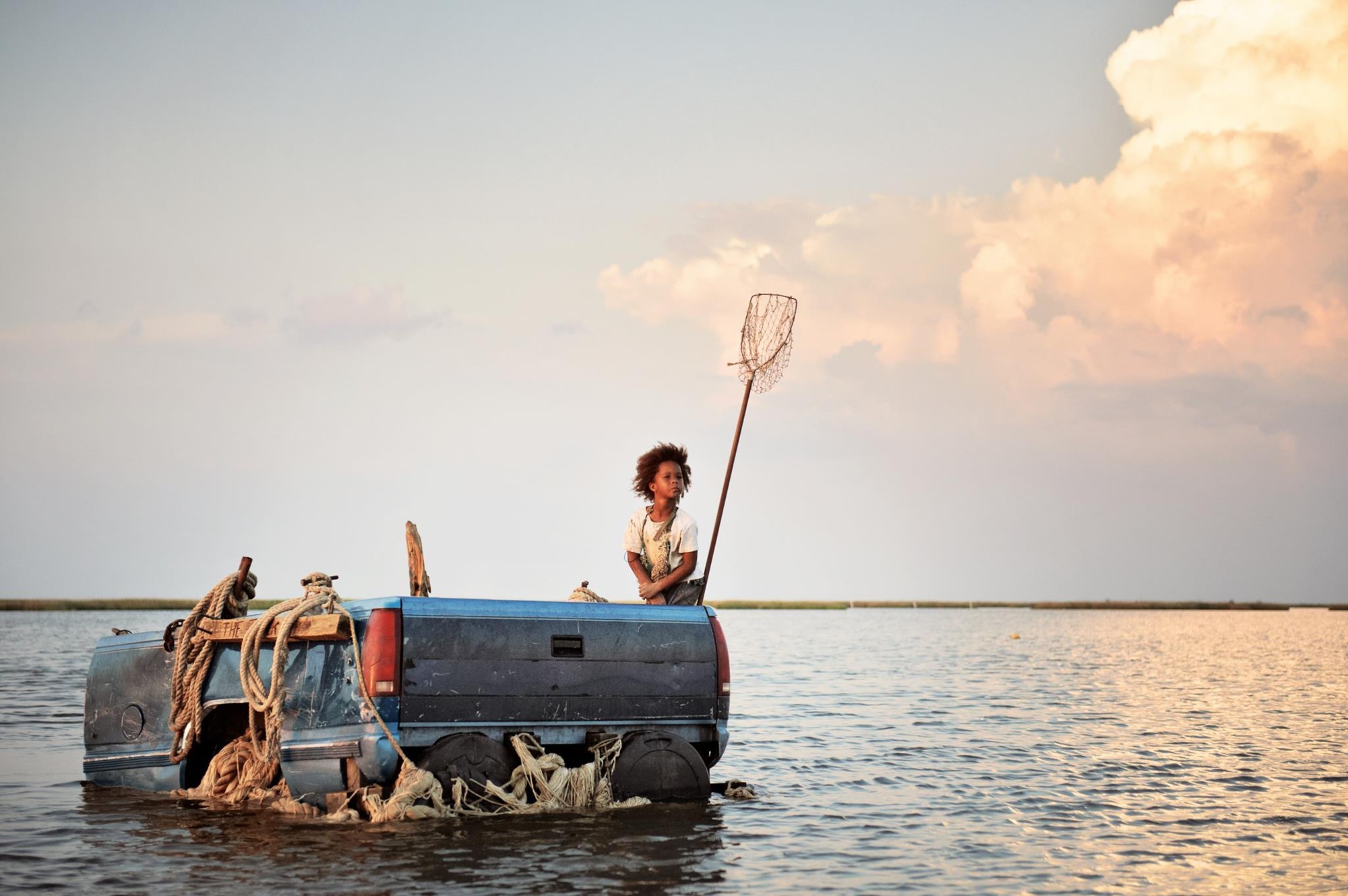John Beifuss, Movie reviewer
Unexpected and unforgettable and unlike almost any movie you've seen, "Beasts of the Southern Wild" is an eco-fable fairy tale set in a swampy landscape at the end of the world where the distinction between the sacred and the humble is irrelevant: Fried alligator functions as a sort of Eucharistic sacrament, and a boat contrived from the back end of a pickup truck becomes a Viking funeral barge.
The movie's hero and narrator is 6-year-old Hushpuppy (newcomer Quvenzhané Wallis), a spunky survivor with a nimbus of tangled reddish hair and a defiant stare that can freeze even a prehistoric auroch in its monstrous hoofed tracks. "Once there was a Hushpuppy and she lived with her daddy in the Bathtub," the girl summarizes, placing herself within the enchanted context of a fairy story while identifying her sparsely populated patch of untamed Southern Louisiana by a name that is homely, unpretentious and paradoxically domestic.
Lifted by a flood tide of critical hosannas and festival awards, "Beasts of the Southern Wild" arrives in Memphis today for an exclusive run at the Malco Ridgeway Four, where it will join the year's other masterpiece-by-acclamation, "Moonrise Kingdom," also a post-Katrina fable of fugitive innocence threatened by a violent storm and well-intentioned but stifling authority. The movies make interesting companions.
Shot on a relatively low budget ($1.5 million) in Cajun country by filmmakers "living off the grid," "Beasts" makes use of untrained actors, natural locations and a handheld documentary shooting style, but debuting feature director Benh Zeitlin - the son of New York "Urban Culture" folklorists, as writers can't resist pointing out - shares Wes Anderson's love of handcrafted props and sets, in-camera special effects and precise, painstaking detail. If the chaotic "Beasts" seems as improvised as a crawdad hole while the lapidary "Moonrise" is as ordered as a doll's house, both movies are very much the products of distinctive and purposeful artistic visions.
"Beasts" is not a flawless film. It can be accused of sentimentalizing ignorance and prettifying poverty (the characters in the film would tell you they have all the learning and possessions they need), and it can be charged with embracing clichéd, even condescending notions about the untutored wisdom, inherent nobility and moral superiority of the "common" people. To this end, Hushpuppy's "folksy" eloquence sometimes suggests a poetical rewrite of "Hambone's Meditations."
Placing her ear against the chests of birds and animals, Hushpuppy muses: "Everything's heart be beating. ... Sometimes they be talking code." When the teacher in the local (apparently unofficial) schoolhouse discusses the melting of the polar icecaps, Hushpuppy offers a warning to climate-change deniers: "Sometimes you can break something so bad that it can't get put back together."
Quibbles be damned: "Beasts" is so fresh, so refreshing (it's a pleasure to encounter an adventurous young filmmaker working outside his social comfort zone), so humanistic in its attitude toward its characters and so resourcefully produced (Zeitlin employs some Toho-style miniatures for a "monster" fantasy sequence) that it overwhelms viewer skepticism like a rising tide. It helps that Quvenzhané is an irresistible and uninhibited performer who makes us accept and admire the unlikely Hushpuppy, who is presented as a Rousseau-esque "natural" person, as comfortable among hogs and chickens as she is with her daddy, Wink (Dwight Henry). She's the latest addition to a wild-child roll call that includes Harper Lee's Scout and Twain's Huck Finn (Hushpuppy, too, resists those who would "sivilize" her); Kipling's Mowgli and Maurice Sendak's Max, from "Where the Wild Things Are"; and, yes, the incorrigible urchins of the old "Our Gang" shorts. (More than one critic has noted Hushpuppy's resemblance to another character named for a simple foodstuff, Buckwheat.)
Adapted by Zeitlin and Lucy Alibar from Alibar's one-act play, "Beasts of the Southern Wild" - which is something of an expansion of Zeitlin's 2008 short, "Glory at Sea" - introduces Hushpuppy and her clan as proud residents of what Wink calls "the prettiest place on Earth," an informal community on the Gulf side of the levee from a civilized world where "they're afraid of the water, like a bunch of babies," Hushpuppy says.
"Daddy always saying up in the dry world they got nothing we got," the girl adds. "They got fish stuck in plastic wrappers ... They got babies stuck in carriages ..."
Hushpuppy's dreamlike happiness - ruffled only by the absence of her long-vanished mother - is upset by a series of traumatic incidents, including a hurricane-like storm (Katrina?) that threatens to become an extinction event for the flooded Bathtub, as presaged by the schoolteacher's lessons about the disappearance of the auroch, a creature Hushpuppy imagines as a giant tusked pig. The storm damage is not as scary as the social service workers and medical relief volunteers who subsequently invade the girl's home, ordering a "mandatory evacuation" to a rescue center that Hushpuppy - as if gasping for breath - describes as "a fish tank without water." The sight of so-called civilization - so clean and mundane, compared to the tangled wonders of the Bathtub - is as distressing for the moviegoer as for the girl.
A more fascinating later episode finds Hushpuppy at a strange offshore dance club, where we hear Fats Waller gruffly croon "Until the Real Thing Comes Along" - possibly the most heartbreaking use of a vintage song since Dinah Washington's "This Bitter Earth" provided an apt coda for Charles Burnett's 1979 masterpiece "Killer of Sheep." The Waller song suggests that life in the Bathtub, for all its charms, is ephemeral and impossible.
Like any fairy tale, "Beasts of the Southern Wild" is open to interpretation. "We ain't going nowhere," say a stubborn Bathtub resident, sounding as isolationist as an anti-government "sovereign citizen." Truer perhaps to Zeitlin's intentions is another of the teacher's assertions - a philosophy that sadly seems antithetical to society's current definition of success: "You gotta learn to take care of people smaller and sweeter than you are."

